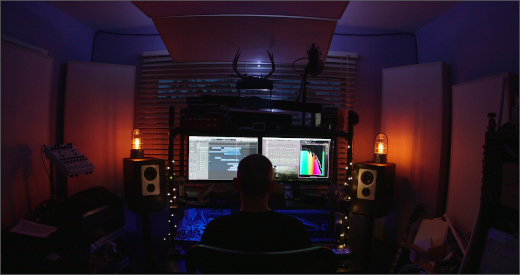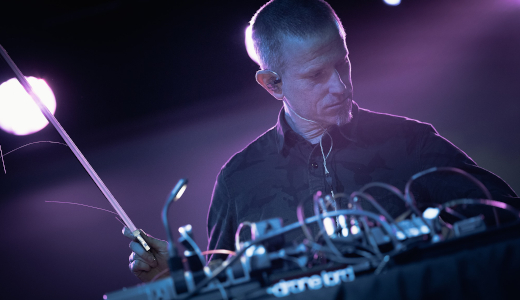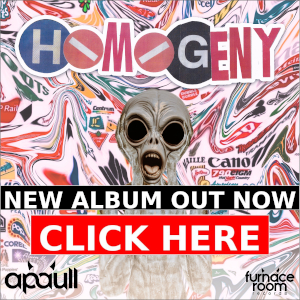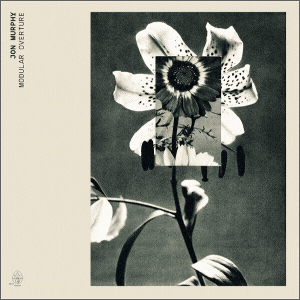Creative Expression

Nathan :: I started job shadowing some architects, and I realized the only thing I liked about architecture was drawing and building models. That was it.
CRT :: Right. Yeah.
Nathan :: That’s when I realized that “you know what? Fuck this.” I need to find a way to pay and earn my way through life being able to express who I am creatively. So, I went to art school. I became an art major.
CRT :: Where’d you go to art school?
Nathan :: Ironically, I went to Carnegie Mellon, which is better known as a computer school.
CRT :: Oh, yeah but they have an amazing art program too. I do know that.
Nathan :: They do. I got introduced to Carnegie Mellon because of their architecture program. Then, I realized that their drama department graduated these amazing, huge things. I’m like “oh, this is weird.” For me, I could be an art major at a place that gave you 24/7 access to the latest in computer technology at all times. That’s what I leveraged it for. That school experience helped me understand how technology could be used as a creative tool. That was a really formative several years for me.
CRT :: That’s amazing. So, you’re at Carnegie Mellon, and you’re transitioning into art stuff. This is the thing, I saw your way awesome DOOM stickers and I didn’t know that you had a visual arts background as well. You’re a bit of a Renaissance man! That’s what I find fascinating, because you’ve got this technical stuff, but then I’m like “oh, he designed those, too?” Shit. You’ve got a really amazing visual sense clearly.
Nathan :: Thank you. I left college as a trainee illustrator. That’s what I was going to do. My journey into the music industry was actually because I graduated college and figured out that my ultimate dream job would be to create album art. I graduated, moved to the West Coast, and immediately started doing just that. It was more of a nightmare than a dream because of course. I couldn’t pay the rent doing it. For the music that I liked, I’m not working for major record labels or huge acts, I’m working for industrial bands that I like, and I’m working for local labels and a couple of European labels.
CRT :: What year was this?
Nathan :: Let me think. 1995.
CRT :: Okay. I’m 52 so you must be a bit a few years younger than me.
Nathan :: I’m catching up on you. I am 50 this year.
CRT :: Oh, congratulations. So back to your origin story. It’s interesting because I totally hear that you’re getting into this music, and then you get out there and you’re like “I’m going to do this.”
Nathan :: Well, I was like, “I would do it but it’s just I have to do something else because this is not going to pay the rent.” It was through making music on the side, buying cheap four-tracks at the secondhand store just to record primitive drum machines so I could have something to play guitar against. I was doing that on the one hand and designing album art on the other hand. Next thing I know, one of the bands that I’m doing album art for heard some of my music and asked if I wanted to remix one of their songs.
CRT :: Oh, cool.
Nathan :: That was the first time I got anything ever actually released on compact disc. From there, I started developing my own musical practice, went through that for several years, released some work on a couple of different labels. Then I ran into this massive crisis of confidence and stopped making music for 10 years.
CRT :: Wow! What happened?
Nathan :: I did a lot of convincing myself that I was a better sound designer than a composer. To me, those seemed very different, so I jettisoned music and went down a path of sound design for post-production and field recording.
CRT :: Interesting.
Nathan :: As I said, about a decade after having made that decision—this is going to sound really strange—I was brushing my teeth one morning, looking at myself in the mirror, and I asked myself in my head “What is the difference between arranging sounds and tones in space and time, and music composition?” I had this idiotic, kind of late to the game epiphany that there is no difference. To me, I don’t care that there is any difference. I see it as one of the same things. I started making music again, and I have never been more prolific.
CRT :: That’s brilliant! I also want to say too please remember who you’re talking to. Nothing sounds strange to me. Really.
Nathan :: That is a fair point.
CRT :: Realizations like that make sense. It’s interesting hearing you say that, because on the one hand it sort of sounds almost like what you’re saying was like a linear progression but at the same time it very clearly wasn’t. Like you’ve kind of arrived at things organically. I mean, granted it’s not like you were a stockbroker and you suddenly saw some kids playing music on a boombox and you were like “What is that? I want to make music like that. It sounds like monkeys trying to fuck a fax machine.“
Nathan :: Okay, we’re going to change my backstory now, that’s way better!
CRT :: [LAUGHS] Okay.
Nathan :: [LAUGHS] You can write a much better story.
CRT :: [LAUGHS] Nathan Moody: The Movie! After carving out his third multi-million-dollar deal on Wall Street, blah blah blah…” Sorry, I’ll come up with something good for you.
Nathan :: All right, perfect.
CRT :: What’s interesting about the 10 years of not making music because I actually had a very long somewhat fallow period as well in the 90s, and I forget why. I think I was trying to really focus on my writing then, I realized that my writing was actually shit and I didn’t write for 10 years. I’ve never really stopped doing music for more than maybe a year or something at a time so even a year itself is pretty startling for me.
Okay, so what was it like for you having gone from sound design for 10 years, and then suddenly realizing “Oh, there’s no difference between this and making music.” That way you put it, by the way, was brilliant. Tell me again what the exact realization was?
Nathan :: It was just the realization that I could give myself permission to believe that there was no difference between composing melody, harmony, counterpoint, and rhythmic delivery for something that’s authentically musical. Arranging sound events that were from real sources or musical, it didn’t matter in time and space as a listening experience. To me it was saying, “I’m going to consider these 100% the same thing. We’re going to see what happens.”
CRT :: That’s brilliant. That reminds me of two things. Do you know who Oz Fritz is?
Nathan :: Actually, I don’t.
CRT :: He’s got this album Bill Laswell’s Material Presents: All Around the World. Oz Fritz is an engineer who made this brilliant album of sound recordings from all over the world. When he’d go to various countries for gigs and stuff he’d always bring out like a Nagra recorder or something. I’m going to send it to you.
Nathan :: I’m already looking at it. When you said Bill Laswell, I’m like “ooooh.”
CRT :: Right? Bill Laswell, pretty much anytime I hear him I’m like, “ooh, wow.” Just today, I was working and “Regiment” from My Life in the Bush of Ghosts came up. I always loved the story Bill Laswell tells of playing bass on that. From session gigs he had been doing, he discovered this sub-bass the studio musicians who were doing disco used. It was with sub bass synthesizers I think where he’d get this really deep bass. Then I was also listening to the Swans album that he produced, which I know to a true Swans fan is not really considered one of their greatest, but I love that record.
Nathan :: Which one is that? Do you remember?
CRT :: I guess it was Burning World?
Nathan :: You know, I’m one of the rare people that love early to late Sonic Youth and Swans. Pretty much all of it. I like each album on its own.
CRT :: Oh, it’s The Burning World!
Nathan :: Yeah.
CRT :: I’ve grown to like the newer stuff from my daughter’s partner who has an immensely open musical taste for someone in their early 20’s. I was such a musical bigot at that age.
Nathan :: Woah!
CRT :: Yeah, it’s pretty cool to have them say “Oh, have you heard this?” Then they play Godspeed You Black Emperor, and I’m like, “Oh shit, yeah. Have you ever heard Swans?” and then they start talking about the old and new stuff. I’m like “Jesus Christ! How do you know all this stuff?!”
Nathan :: That is a rare joy to have. That’s awesome!
<< previous page | next page >>


















![Allmanna Town :: 1911 EP (Self Released) — [concise]](https://igloomag.com/wp/wp-content/uploads/2025/03/allmannatown-1911_feat2-75x75.jpg)


